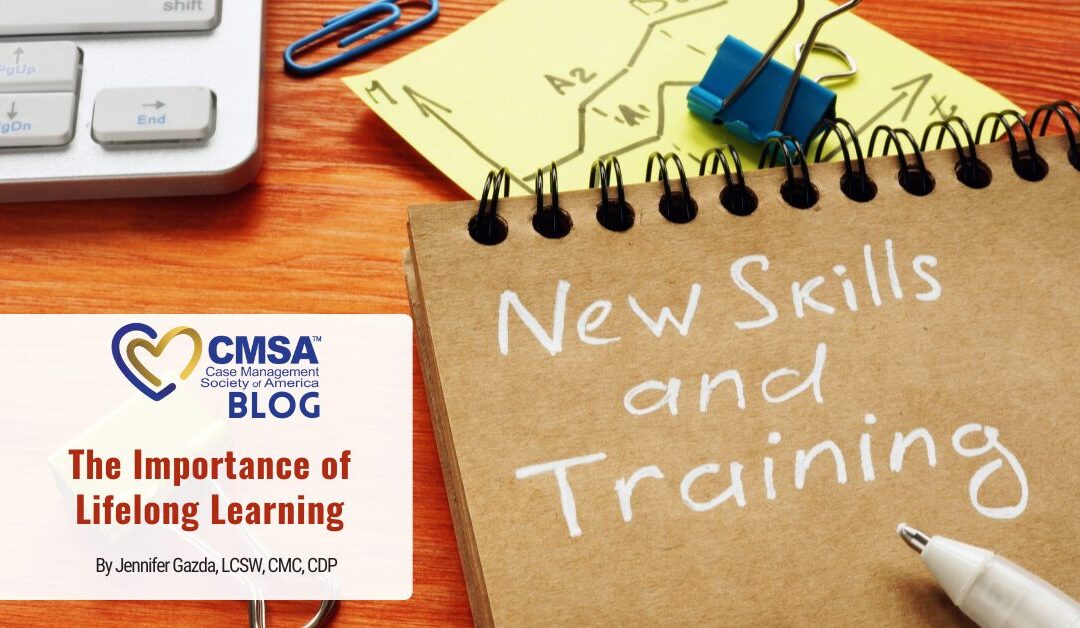By Jennifer Gazda, LCSW, CMC, CDP
Remember that feeling when you graduated (high school, college, you name it!) and felt like you were on top of the world and could do anything? If you were anything like me, the next thought was - this is it? Now I have to work, and I don’t get that grade anymore, which tells me I did well. With many students returning to school this fall, it provides a good reminder about the importance of continuous learning to support your career and your personal growth.
Many of us hold various credentials that require continuing education. Have you ever been on a virtual CE and multitasked and did any work while earning that education? I envision many people doing it when they do not turn on their camera instead of being engaged with the content. I could be doing a better job of being engaged when that is what I am thinking about. CEs are only one form of education, and the type of learning I want to discuss is not the “required” content we need for our licensures. It is the ultimate form of learning - identifying gaps and weaknesses in ourselves and going on that hunt to absorb as much knowledge as possible about that topic to improve yourself and your skills.
Yes, we need to know the current trends in our fields. But there will always be that one client, family member, and coworker who throws you in a loop. Your years of experience and education could have prepared you for what is right in front of you and how to handle it. It’s what you do next that determines your level of passion for learning. Sometimes, when learning to navigate something new, we make a mistake—the greatest way to learn and retain the information of what you learned is through making mistakes. While making an error certainly is humbling, it is a learning opportunity, and the way you view the next step from that mistake can catapult you to a brighter future. Challenge yourself to discover what happened and how to prevent it from happening again to achieve better outcomes. Ask yourself: what could I have done differently?
I view lifelong learning as a daily practice. I aim to continue challenging myself to learn new things and put myself in uncomfortable situations to further my growth. Over the years, this has helped to build my confidence when I often felt like I was not performing well enough for a certain position or task. It has also helped me tremendously to challenge my team in a supportive way, to better themselves, and to try new things. One individual I have worked with was content with staying in the same role for years to come, but I saw something amazing in them, so I pushed them outside of their comfort zone. I’m happy to say that a promotion to a new position did occur and has been successful.
Learning does not have to be strategic or from a book. Experiential learning is arguably one of the most memorable types of learning and allows for applying the skills and knowledge you have learned over time. As a social work student, I had internship experiences that allowed for this learning style before entering the workforce. It felt like a safe space to practice the skills I was learning and the support was built in so that I did not feel lost and alone. The simple act of observing others can also provide a great amount of information to the observer. I find myself always observing and thinking of how what I have learned in school as a social work.
Student transfers to other areas, such as family systems and how it functions can inform organizational team dynamics. That’s a blog for another time!
At the end of the day, ask yourself what you learned. Sometimes it may be something small like, do not take the expressway to work after 7:30 am or let the coffee sit for five minutes before taking a sip. Other times, it can be what you need to know to make that big next step in your career or personal life. Today, I learned that writing a blog differs from other forms of writing, and I am excited to think about other topics that deserve your time and attention.
This fall, CMSA is offering a range of high-impact training programs designed to enhance your skills, expand your knowledge, and advance your professional growth, including in-person, live/virtual and on-demand courses. Go to https://bit.ly/CMSAEducation to learn more and register!
Bio: Jennifer Gazda, LCSW, CMC, CDP holds a Doctorate of Social Work from Aurora University and has dedicated the majority of her career to helping the geriatric population and their families. Jennifer has held the role of case manager in a variety of settings including child welfare, skilled nursing, and hospitals. Jennifer currently is Regional Director for Arosa, provider of care management and home care services across the country.


Each day is so important in the roles we do and of life to be open to learning. You are absolutely accurate. In the role of Casemanagement each day provides new challenges.